Solar eclipse of January 4, 2011
| Solar eclipse of January 4, 2011 | |
|---|---|
 Partial from Poland | |
 Map | |
| Type of eclipse | |
| Nature | Partial |
| Gamma | 1.0627 |
| Magnitude | 0.8576 |
| Maximum eclipse | |
| Coordinates | 64°42′N 20°48′E / 64.7°N 20.8°E |
| Times (UTC) | |
| (P1) Partial begin | 6:40:11 |
| Greatest eclipse | 8:51:42 |
| (P4) Partial end | 11:00:52 |
| References | |
| Saros | 151 (14 of 72) |
| Catalog # (SE5000) | 9531 |
The solar eclipse of January 4, 2011 was a partial eclipse of the Sun that was visible after sunrise over most of Europe, northwestern and South Asia. It ended at sunset over eastern Asia. It was visible as a minor partial eclipse over northern Africa and the Arabian peninsula. The eclipse belonged to Saros 151 and was number 14 of 72 eclipses in the series.
Greatest eclipse occurred at 08:51 UTC in northern Sweden where the eclipse in the horizon had a magnitude of 0.858. At that time, the axis of the Moon's shadow passed a mere 510 km above Earth's surface.[1]
A solar eclipse occurs when the Moon passes between Earth and the Sun, thereby totally or partly obscuring the image of the Sun for a viewer on Earth. A partial solar eclipse occurs in the polar regions of the Earth when the center of the Moon's shadow misses the Earth. This was the first of four partial solar eclipses in 2011, with the others occurring on June 1, 2011, July 1, 2011, and November 25, 2011.
It also precedes the two total lunar eclipses occurring on June 15, 2011 and December 10, 2011.
Visibility[]
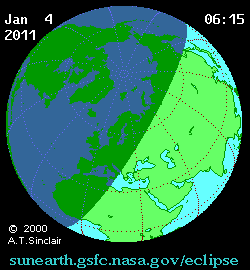
Animated path
Photo gallery[]
Slobozia, Romania at 7:52 UTC

Almería, Spain at 8:03 UTC

Avellino, Italy at 8:18 UTC
Ebersberg, Germany at 8:32 UTC

Composite image from Bernau am Chiemsee, Germany

Vienna, Austria at 8:34 UTC
Stockholm, Sweden at 8:36 UTC
Marki, Poland at 8:38 UTC

Progression from Katowice, Poland

Petrov nad Desnou, Czech Republic at 8:41 UTC
Bratislava, Slovakia at 8:43 UTC

Tomsk, Russia at 8:44 UTC
Video from Moscow, Russia
Sana'a, Yemen at 8:47 UTC

From Moscow, Russia at 9:02 UTC.

Kirkcaldy, Scotland at 9:14 UTC

Haarlem, Netherlands, 9:29 UTC
Related eclipses[]
Eclipses of 2011[]
- A partial solar eclipse on January 4.
- A partial solar eclipse on June 1.
- A total lunar eclipse on June 15.
- A partial solar eclipse on July 1.
- A partial solar eclipse on November 25.
- A total lunar eclipse on December 10.
It was preceded two weeks earlier by the total lunar eclipse of December 21, 2010.
Solar eclipses 2008–2011[]
This eclipse is a member of a semester series. An eclipse in a semester series of solar eclipses repeats approximately every 177 days and 4 hours (a semester) at alternating nodes of the Moon's orbit.[2]
| Solar eclipse series sets from 2008–2011 | ||||||
|---|---|---|---|---|---|---|
| Ascending node | Descending node | |||||
| Saros | Map | Gamma | Saros | Map | Gamma | |
121 Partial from Christchurch, NZ |
2008 February 07 Annular |
-0.9570 | 126 Novosibirsk, Russia |
2008 August 01 Total |
0.8307 | |
131 Partial from Riversdal |
2009 January 26 Annular |
-0.2819 | 136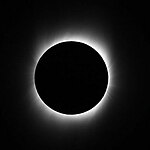 Kurigram, Bangladesh |
2009 July 22 Total |
0.0698 | |
141 Bangui, Central African Republic |
2010 January 15 Annular |
0.4002 | 146 Hao, French Polynesia |
2010 July 11 Total |
-0.6787 | |
151 Partial from Vienna, Austria |
2011 January 04 Partial (north) |
1.0626 | 156 | 2011 July 01 Partial (south) |
-1.4917 | |
| Partial solar eclipses on June 1, 2011, and November 25, 2011, occur on the next lunar year eclipse set. | ||||||
Metonic series[]
The metonic series repeats eclipses every 19 years (6939.69 days), lasting about 5 cycles. Eclipses occur in nearly the same calendar date. In addition, the octon subseries repeats 1/5 of that or every 3.8 years (1387.94 days). All eclipses in this table occur at the Moon's ascending node.
| 22 eclipse events between January 5, 1935 and August 11, 2018 | ||||
|---|---|---|---|---|
| January 4-5 | October 23-24 | August 10-12 | May 30-31 | March 18-19 |
| 111 | 113 | 115 | 117 | 119 |
 January 5, 1935 |
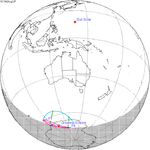 August 12, 1942 |
 May 30, 1946 |
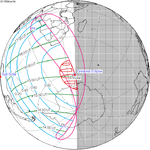 March 18, 1950 | |
| 121 | 123 | 125 | 127 | 129 |
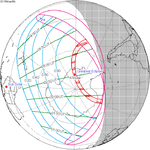 January 5, 1954 |
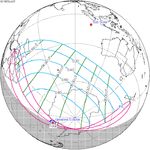 October 23, 1957 |
 August 11, 1961 |
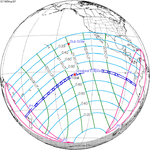 May 30, 1965 |
 March 18, 1969 |
| 131 | 133 | 135 | 137 | 139 |
 January 4, 1973 |
 October 23, 1976 |
 August 10, 1980 |
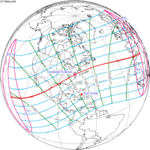 May 30, 1984 |
 March 18, 1988 |
| 141 | 143 | 145 | 147 | 149 |
 January 4, 1992 |
 October 24, 1995 |
 August 11, 1999 |
 May 31, 2003 |
 March 19, 2007 |
| 151 | 153 | 155 | ||
 January 4, 2011 |
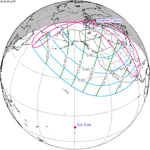 October 23, 2014 |
 August 11, 2018 |
||
Notes[]
- ^ Eclipses during 2011 NASA
- ^ van Gent, R.H. "Solar- and Lunar-Eclipse Predictions from Antiquity to the Present". A Catalogue of Eclipse Cycles. Utrecht University. Retrieved 6 October 2018.
References[]
- Earth visibility chart and eclipse statistics Eclipse Predictions by Fred Espenak, NASA/GSFC
- NASA Chart PDF
External links[]
| Wikimedia Commons has media related to Solar eclipse of 2011 January 4. |
- Live web-cast of the Partial Solar Eclipse of 2011 Jan 04 Bareket observatory, Israel
- Solar eclipse of 2011 January 4. Russia, Moscow. 4 Photos
- APOD 1/5/2011 [1], 1/6/2011 [2], 1/7/2011 [3]
- SpaceWeather.com Solar eclipse gallery On Jan. 4, 2011
- Solar Eclipse from spain
- Partial solar eclipses
- 2011 in science
- 21st-century solar eclipses
- January 2011 events




















